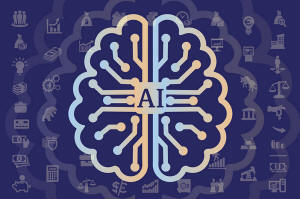AI is becoming ingrained in businesses across industries. Where is it
going in 2025?
 Send a link to a friend
Send a link to a friend
 [December 30, 2024] By
WYATTE GRANTHAM-PHILIPS [December 30, 2024] By
WYATTE GRANTHAM-PHILIPS
NEW YORK (AP) — As artificial intelligence continues to grow at a rapid
pace, more and more businesses are grappling with how to adapt both
quickly and responsibly.
Dan Priest is the new Chief AI Officer at PwC, one of the world's
largest consulting firms, where he works with companies across
industries as they adopt this burgeoning technology both into their
day-to-day operations and future business models. He says 2024 was all
about proving what AI brings to the table — and expects 2025 will shift
more into scaling it.
Priest recently spoke with The Associated Press about his new role and
other AI business predictions his team has for the year ahead. The
interview has been edited for length and clarity.
Q: When did PwC decide it wanted a Chief AI Officer?
A: We launched the role in early July, on the heels of us doing an AI
impact analysis and strategy for the firm. The motivation was simply to
make sure we were tapping into AI's full potential, responsibly, to best
serve our clients. We work with companies across a range of sectors —
including tech, health care and hospitality.

Q: What have the companies you work with told you about how they're
adopting AI?
A: AI is showing up in some form or fashion for the majority of our
clients these days. In a recent survey that we did of Fortune 1000
companies, nearly half of respondents said AI is fully embedded in their
workflows — and then about a third had even embedded it in their
products and services.
And AI is more than just a tech initiative, it's also adjusting business
strategies. CEOs overwhelmingly recognize that AI will impact their
business model in some way — with about 73% of those we spoke to in a
predictions report saying that they believe AI would cause a shift in
their business model. In particular, we're increasingly seeing
generative AI both in the presence of the consumer and throughout
product development.
[to top of second column] |

(AP Illustration/Jenni Sohn)
 Q: Can you give me examples of what
that looks like?
A: To be competitive, companies can’t just predict what consumers
want anymore. You have to give them a way to personalize the
specific products and services they want — and gen AI has a means of
doing that.
Take a business in the cruising sector, for example. In the past,
cruise lines would have to predict what each type of foods, products
and excursions people wanted. Now, with gen AI, they can have a
personalization engine that says, “I’m a fan of these luxury
products,” and then make sure those types of luxury products are on
board. Or, “I’m a fan of this type of food," and they can make sure
that food is on the menu. It gives companies a way to personalize
the experience that wasn't possible before.
Q: What risks should companies keep in mind when approaching AI?
A: AI is not monolithic, and there are different maturity levels for
different uses. You’ve seen issues in contact centers, for example,
where AI agents were introduced and in some cases gave customers
hallucinations with wrong information. And so having a “maturity
test” to make sure they tech you're using is ready for prime time,
particularly when it's customer-facing, is important. Those same
disciplines are critical for protecting internal data, which you
don't want inadvertently training a large language model.
That’s one category of risk. On the other side of all of this,
another risk is not moving quickly enough and falling behind. Your
AI strategy will either put you ahead or make it hard to ever catch
up. If we take a lesson from the Internet era, a lot of those early
movers ended up being winners for the next ten, 20 years. We expect
to see something very similar for companies that embrace AI today,
both early on and in a trustworthy way.
All contents © copyright 2024 Associated Press. All rights reserved |